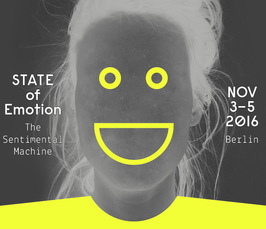The Max Planck Society at State Festival 2016- State of Emotion
Events in Berlin
- Date: Nov 4, 2016
- Time: 10:00 AM - 02:15 PM (Local Time Germany)
- Speaker: Tom Fritz, MPI of Human Cognitive and Brain Sciences, Daphne Rozenblatt (MPI for Human Development)
- Location: Kühlhaus, Luckenwalder Straße 3, 10963 Berlin
- Host: State Festival in cooperation with Max Planck Society

Max Planck Society at State Festival 2016:
History of Emotions
4.11.2016, 10:00 - 14:00 h
Are emotions universal to all humans or are they dependent on the cultural environment of individuals? A History of Emotions takes many pathways in regard to the origin and the direction of how we feel, and how we perceive the feelings of others.
Helen Stark from the School of History at Queen Mary University of London and Daphne Rozenblatt from Max Planck Institute for Human Development will provide the public with a clear picture of where we stand in regard to the history of emotions, drawing attention to the political and legal aspects of our trajectory.
Adam Anderson and Dr. Eve de Rosa from the Affect and Cognition Lab in Cornell will bring us state-of-the-art research methods about the psychological and neural foundations of emotion and cognition. From animal models and magnetic resonance imaging, the public will get an idea of how scientists are attempting to understand the nature of affection.
Speakers:
Daphne Rozenblatt, Max Planck Institute for Human Development, Berlin
Eve de Rosa, University of Toronto, Psychology and Affect & Cognition Lab (ACL)
Adam Anderson, University of Toronto Canada, Cognitive and Affective Neuroscience
Helen Stark, Queen Mary University of London, Center for the History of Emotions
Jymmin
4.11.2016, 13:00 - 14:15
"Jymmin" is a combination of "jamming" and "gym", a mixture of free musical improvisation and sports. Scientists at the Max Planck Institute for Human Cognitive and Brain Sciences in Leipzig retrofitted conventional fitness machines to produce music during a workout. When using jymmin machines, gym-goers become composers, controlling the music they create. Tom Fritz, the project’s leader explains, ”We are using jymmin machines in our research in order to discover more about the beneficial effects of music-induced ecstasy.”
The results recorded by the Leipzig-based researchers show that musical fitness equipment responding to user movements reduced physical exertion during exercise, and improves mood to a far greater extent than passive music listening. When research participants began their workout on the jymmin machines they retained their good mood, even after the second workout during which they listened to music passively.
Thus, the current study suggests that the technique may be suitable for mood-enhancing self therapy. "As a result," continues Fritz, "we now want to investigate how we can use music to treat such conditions as motivational deficits and depression."
Speaker: Tom Fritz, Max Planck Institute for Human Cognitive and Brain Sciences, Leipzig
13:00 - 13:45 Conversation
13:45 - 14:15 Jymmin Demonstration
The talks are part of the main festival programme.
To get your ticket, please visit the website of State Festival.